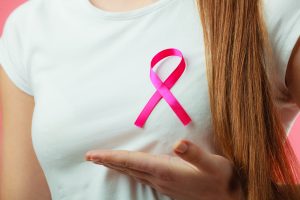What do lemons have to say about breast cancer? Apparently, a lot!

It’s all part of the organization’s “Know Your Lemons” campaign.
Nearly half of women do not know what a cancerous lump feels like and even fewer know what the 12 signs of breast cancer are, according to Worldwide Breast Cancer, who shared the stat in a Facebook post on Oct. 13, 2016.
What does a cancerous lump feel like? It apparently feels a lot like a lemon seed!
What are the 12 signs of breast cancer? According to Worldwide Breast Cancer and #KnowYourLemons, the 12 signs of breast cancer are:
- feeling a thick mass
- indentation
- skin sores
- redness or heat
- unusual or new fluid
- dimpling
- bump
- growing vein
- retracted nipple
- new shape/size
- orange peel skin
- hidden lump
Those signs can seem a little daunting on paper, especially with no visual reference to give women a clearer picture of what the signs might mean to them. (It’s also true that not all signs point to breast cancer, so it’s important to check with your doctor if you notice any changes.)
Worldwide Breast Cancer hopes its #KnowYourLemons images will make checking for signs of breast cancer easier and less discouraging for women everywhere.
Why lemons?
Lemons are a familiar food to most and Worldwide Breast Cancer believes it’s this simplicity and familiarity that will help women look for and understand the changes that happen when breast cancer is forming.

The photo is bright and colorful; the lemons depict the 12 signs in a way that is easy to understand and, hopefully, easy to apply in real life.
As part of its mission, Worldwide Breast Cancer is using “the power of design” to educate and empower women all over the world. It created four images as part of #knowyourlemons, each meant to make recognizing the signs of early breast cancer easier for women.
These images are especially important in areas where literacy is a concern — which, to put it bluntly, is everywhere. As the organization explains on its website, 1 in 5 patients in the United States have low literacy and, on a global scale, literacy is a much bigger problem.
“Most health messages are still communicated through text,” Worldwide Breast Cancer writes on its website. This makes the organization’s images all the more important as they can help “spread the word” about early breast cancer detection without actually using words.
Again, why lemons?
Lemons are not only a familiar food, they’re also family friendly.
As Worldwide Breast Cancer points out, images of breasts are typically censored because breasts are most often associated with sex.
So what’s a girl who’s trying to prevent breast cancer to do? Look at images of weeping, pitted lemons, of course.
Until society can handle looking at images of breasts on the regular, lemons are an easy stand-in.
To see the #knowyourlemons images and to learn more about the Know Your Lemons campaign, visit the Worldwide Breast Cancer’s website: https://www.worldwidebreastcancer.org/
How might breast cancer affect you?
About 1 in 8 women in the United States will develop invasive breast cancer over the course of her lifetime, according to breastcancer.org. That’s 12% of U.S. women.
In 2017, more than 255,000 new cases of breast cancer are expected to be diagnosed in U.S. women, along with over 63,000 new cases of non-invasive breast cancer.
The earlier breast cancer is detected, the better because it increases your chances of beating it, says breastcancer.org.
When breast cancer does strike, it can be a devastating blow to both the patient and their family and friends.
Some women who have been treated for breast cancer have been treated with the chemotherapy medication Taxotere. Manufactured by French pharmaceutical company Sanofi, Taxotere is a potent medication that has unwanted side effects for an unknown percentage of its users: permanent hair loss.
What starts as an unpleasant side effect of chemotherapy becomes a life-long reminder that a patient was indeed sick with cancer.
Taxotere-induced permanent hair loss has potentially affected thousands of women in the United States, many of whom have begun filing lawsuits against Sanofi.
Taxotere lawsuits accuse Sanofi of designing a defective drug and failing to adequately warn about its risks of permanent hair loss.
If you or someone you love was treated with Taxotere and suffered permanent hair loss as a result, you may be entitled to financial compensation. The experienced Taxotere attorneys at National Injury Attorneys, LLC are ready to hear your story and help you file a claim if you qualify.
Call National Injury Attorneys, LLC today at 1-800-214-1010 for a free case evaluation or use the form on the right-hand side of the screen.
Note: The information provided in this article is based on reports from publicly available sources, including news outlets, police reports, and eyewitness accounts. National Injury Help has not independently verified all details of the reported incident. If you find any inaccurate or outdated information, please contact us, and we will review and update the content as appropriate. The photo used in this post is for illustrative purposes only and does not depict the actual scene of the incident.
Disclaimer: The content of this article is intended for informational purposes only and does not constitute legal advice or establish an attorney-client relationship with National Injury Help. For legal assistance specific to your case, we encourage you to contact a qualified attorney.
Free Case Evaluation
Contact Us today for a FREE, Immediate Case Evaluation
Contact Us today for a FREE, Immediate Case Evaluation
Categories
Recent post
- Mesa, AZ – Jeep Overturns in Two-Vehicle Crash on Greenfield Rd
- Tempe, AZ – Injury Crash on I-10 EB at US 60 Transition Ramp
- Youngtown, AZ – Two Pedestrians Hurt in Hit-and-Run on Grand Ave
- Phoenix, AZ – Roberto Olivas muere en choque a alta velocidad en Van Buren St
- Phoenix, AZ – Brittany Geib y su perro mueren en accidente seguido de fuga en 51st Ave




